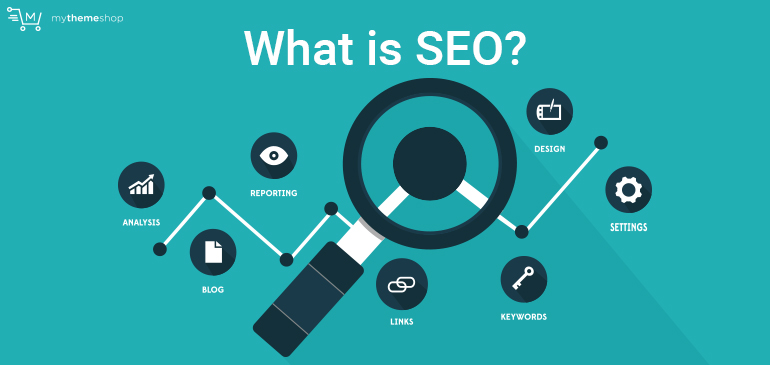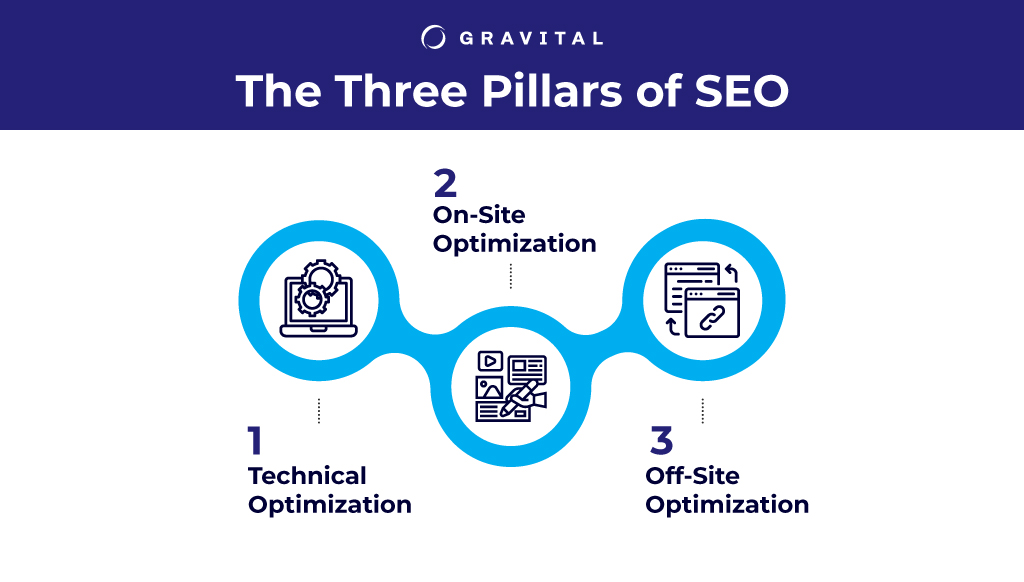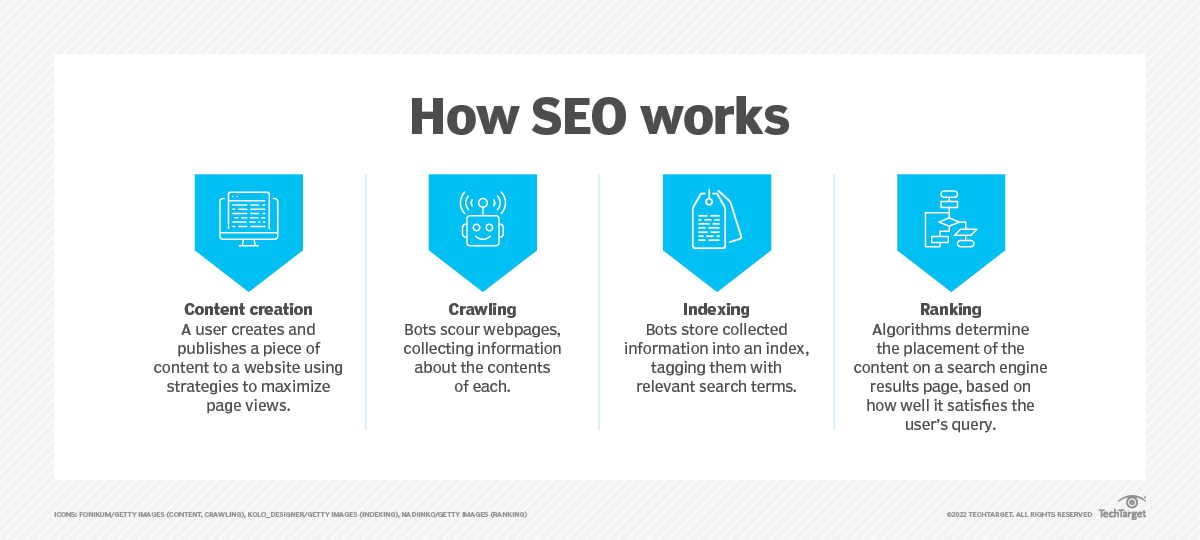In today’s digital era, mastering search engine optimization (SEO) is crucial for online success. SEO determines your visibility on search engine results pages (SERPs), making it essential for individuals and businesses. But what is SEO and how it works its magic?
Let’s dive into the intricacies of SEO to understand its role in shaping the digital landscape.
What is SEO?

SEO stands for Search Engine Optimization. Simply put, it’s all about making your website more attractive to search engines like Google. The better you do at SEO, the higher your website appears in search results when people type in things related to your website.
Think of it like a contest to be the top pick on search engines. SEO helps you win that contest! Following some best practices can improve your website’s chances of ranking high. This means more people will find your website without you needing to pay for ads.
What are the main pillars of SEO?
The main pillars of SEO, also known as the fundamental elements or core components, encompass various aspects of optimization that improve a website’s visibility and ranking in search engine results pages (SERPs). There are two main ways to look at the pillars of SEO.
with three or four categories. Both approaches are valid and focus on different aspects.
Three Pillar View:
-
Relevance
This focuses on how well your website’s content aligns with what users are searching for. It involves using the right keywords, creating informative and valuable content, and ensuring your site structure is straightforward.
-
Authority
Search engines consider how trustworthy and reliable your website is. This can be built by getting high-quality websites to link to yours, having a positive online reputation, and providing accurate and valuable information.
-
Experience
This pillar is sometimes called “UX,” which stands for User Experience. It focuses on how easy and enjoyable it is for visitors to use your website. This includes fast loading speed, mobile-friendliness, and a clear and straightforward layout.
Three Pillar View:

This view breaks down the three pillars above into more specific categories:
-
Technical SEO
This ensures the technical aspects of your website are functioning properly, making it easy for search engine crawlers to find, index, and understand your content.
-
On-page SEO
This focuses on optimizing the content on your website pages, including using relevant keywords, writing explicit and informative content, and optimizing titles and meta descriptions.
-
Off-page SEO
involves building your website’s authority by getting high-quality websites to link back to yours. This can be achieved through guest blogging, social media promotion, and other link-building strategies.
Both three and four-pillar views offer valuable perspectives on SEO. The three-pillar view provides a broader understanding of the core factors influencing search engine rankings. The four-pillar view dives deeper into specific actions you can take to improve your website’s SEO.
How do search engines work?

Search engines work through a complex process of crawling, indexing, and ranking web pages to provide users with relevant and authoritative query results. Here’s a simplified overview of how search engines like Google work:
-
Content:
This pillar emphasizes the importance of high-quality content that is valuable and informative to your target audience. Content can come in many forms, including blog posts, articles, videos, and infographics.
- Crawling:
Imagine millions of tiny robots, called crawlers, constantly hopping from website to website. Search engines send these crawlers to discover new web pages and keep track of existing ones.
- Indexing:
Once the crawlers find a webpage, they take a snapshot of its content, like keywords and what the page is about. This information gets stored in a giant digital library called an index.
- Ranking:
When you type in a search, the search engine dives into its index to find the web pages most relevant to your question. Special programs, called algorithms, consider many factors to rank these pages. Some important factors include how well the content matches your search terms and how trustworthy the website seems.
So, SEO comes in by helping your website be more discoverable by the crawlers, well-organized for the index, and relevant for search engine algorithms. Following SEO practices can increase your chances of being picked as a top result!
Why is SEO important?
SEO (Search Engine Optimization) is crucial for several reasons:
-
Increased Visibility:
Imagine having a great store, but it’s tucked away on a hidden street. SEO is like putting a giant neon sign above your website, making it easier for people to find you when they search for things related to your business. The higher you rank in search results, the more likely people will visit your website.
-
Free Traffic:
Unlike paid advertising, SEO helps you attract visitors organically. This means you don’t need to pay for every click on your website. By ranking well in search results, you can get a steady stream of free visitors interested in your offer.
-
Credibility and Trust:
When your website ranks high in search results, search engines view your site as a valuable resource. This can boost your credibility and make you appear more trustworthy to potential customers.
-
Targeted Audience:
SEO allows you to target your ideal audience. By using relevant keywords and creating content that addresses their needs, you can attract visitors who are genuinely interested in what you have to offer.
-
Long-Term Benefits:
SEO is a long-term strategy. Once you’ve optimized your website and built your authority, you can continue to reap the benefits for years.
In short, SEO is an investment that can pay off in a big way by bringing more visitors, leads, and potential customers to your website.
How does Google order and rank search results?
Google uses a complex algorithm to order and rank search results, considering hundreds of factors to determine the most relevant and authoritative pages for a search query. While Google’s exact algorithm is proprietary and constantly evolving, here are some key factors that influence how Google ranks search results:
- Relevance
- Quality of content
- Backlinks
- User experience
- Page loading speed
- Multimedia relevance
- Keyword optimization
- Search intent
- Freshness
- Local relevance.
The algorithm considers these factors to deliver the most relevant and authoritative pages for a given search query, aiming to provide users with the best search experience.
Ready to Start Your SEO Journey?
Stay confident with the vastness of SEO. Start by identifying your target audience and the keywords they might use. Then, create high-quality, informative content around those keywords and optimize your website for a smooth user experience. Remember, SEO is a marathon, not a sprint. By consistently creating valuable content and implementing best practices, you’ll climb the search engine rankings and attract a steady stream of visitors to your website.
This guide is just the first step in your SEO adventure. With a little effort and the right approach, you can conquer the search engine jungle and watch your website flourish!
In conclusion:
SEO is essential for online success, driving visibility and relevance in the digital realm. Embracing its power is crucial in unlocking limitless opportunities and achieving digital goals.

Leave a Reply